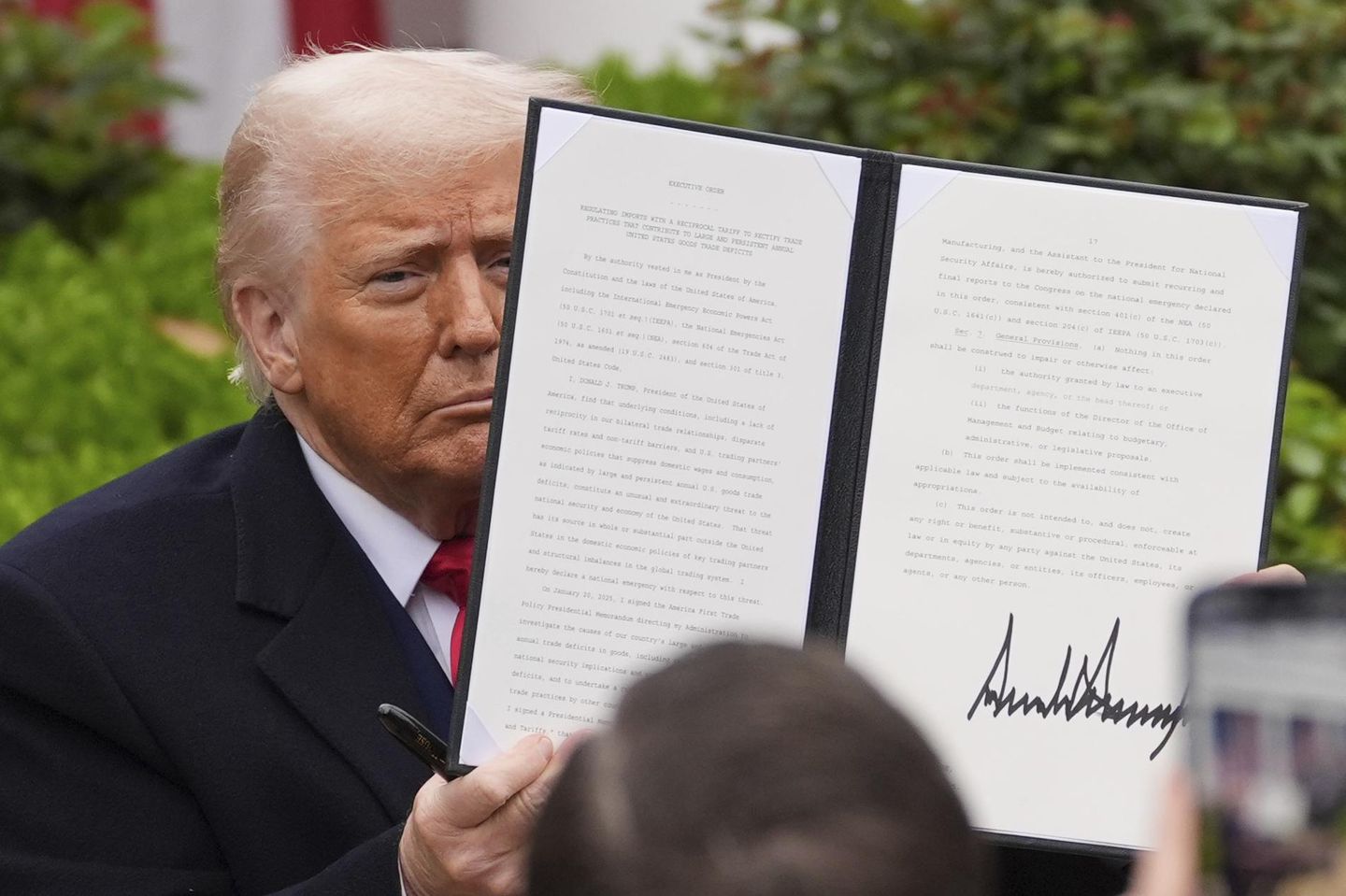
White House officials said Sunday that President Trump will not pause the tariffs his administration has imposed on imports as part of his push to reshape global trade.
Commerce Secretary Howard Lutnick said the latest round of tariffs would have “no postponing” and that some affected nations were signaling a willingness to reconsider trade barriers.
“They are definitely going to stay in place for days and weeks. That is sort of obvious,” Mr. Lutnick said Sunday on CBS’s “Face the Nation.” “The president needs to reset global trade.”
Team Trump fanned out across the television talk shows Sunday to respond to the stiff international blowback after the president rolled out 10% baseline tariffs on all imports and reciprocal tariffs on specific countries.
The tariff announcement sent shock waves through global markets and fueled concerns that Mr. Trump was steering the nation and the rest of the world toward a recession.
The free fall in Thursday and Friday trading erased $6.6 trillion in stock market value.
SEE ALSO: Top Trump trade adviser denies rift with Elon Musk over tariffs
Economists warned that the tariffs could spark a trade war that could lead to higher inflation and slower growth and that tariffs would raise consumer prices.
Trump officials downplayed the outcry as media-induced hype and said the market would start to stabilize.
They said the short-term pain would yield long-term gains through fairer trade deals, a revitalization of the nation’s manufacturing base and a stronger overall economy.
Over the weekend, Mr. Trump urged Americans to “hang tough.” Treasury Secretary Scott Bessent looked to ease concerns about the stock market, saying, “There doesn’t have to be a recession.
“Who knows how the market is going to react in a day, in a week,” Mr. Bessent said on NBC’s “Meet the Press.” “This is an adjustment process.”
Mr. Bessent called the idea that the tariffs were upending the retirement plans of everyday Americans a “false narrative” that overinterpreted day-to-day fluctuations.
SEE ALSO: Trump’s commerce chief says administration’s tariffs to stay course amid markets tumult
“Americans who want to retire right now, Americans who have put away for years in their savings accounts, I think they don’t look at the day-to-day fluctuations of what’s happening,” he said.
Foreign countries’ responses have been mixed. China added a 34% tariff on U.S. goods to Vietnam after Mr. Trump announced a “very productive call” with leader To Lam about lowering Vietnam’s trade barriers.
Israeli Prime Minister Benjamin Netanyahu was scheduled to travel to Washington on Sunday in part to discuss tariffs with Mr. Trump.
White House National Economic Council Director Kevin Hassett said 50 countries had contacted the White House to begin new trade negotiations. He rebutted critics who said consumers would be forced to pay more.
“They’re doing that because they understand that they bear a lot of the tariff,” Mr. Hassett said on ABC’s “This Week.” “And so, I don’t think that you’re going to see a big effect on the consumer in the U.S.”
Sen. Maria Cantwell, Washington Democrat, said the tariffs were creating bipartisan anxiety on Capitol Hill. Some Republicans support her legislative push to mandate congressional approval of tariffs imposed by a president within 60 days.
“I’m sure if they listen to their constituents, consumer challenges are already starting to surface, and certainly the stock market’s impact on retirement income is shaking a lot of people,” Ms. Cantwell, a member of the Senate Finance Committee, said on CBS’s “Face the Nation.”
Senior trade adviser Peter Navarro said people should not “get shook up by the panic in the media.”
“First rule, particularly for the smaller investors out there, you can’t lose money unless you sell, and right now, the smart strategy is not to panic, just stay in because we are going to have the biggest boom in the stock market we have ever seen under the Trump policies,” Mr. Navarro said on the Fox News program “Sunday Morning Futures.”
Mr. Trump insists that countries have taken advantage of the U.S. by tapping into American consumers’ spending power only to shut their markets to American producers.
The Dow Jones Industrial Average closed down more than 2,200 points, or 5.5%, on Friday. The S&P 500 and Nasdaq each dropped more than 5%.
The market grew bleaker Sunday as U.S. stock futures dropped. Dow Jones Industrial Average futures fell 1,531 points, or 4%. Futures tied to the S&P 500 and Nasdaq futures also fell 4% each in early trading.
Tariffs are taxes or duties importers pay on goods from foreign markets.
Mr. Trump says tariffs will force companies to return to America or keep their operations in the U.S., employ American workers and create revenue to fund domestic programs.
Foreign countries don’t pay the tariffs directly to the U.S. Treasury. In many cases, U.S. companies will pay the levies, and they may pass along at least some of the costs to consumers through higher prices.
The White House said Mr. Trump’s tactics were paying dividends. Japanese automaker Nissan said it would maintain two shifts at its plant in Smyrna, Tennessee, instead of going with one shift.
General Motors said it would increase truck production at an Indiana plant. Ford and Stellantis are offering cars at the discounted prices the automakers give their employees.
Although Vietnam tried to work with the U.S., Beijing’s response with tariffs on American imports indicated a tit-for-tat among nations as the world reacted to Mr. Trump’s trade actions.
Vietnam was among the hardest-hit countries on Mr. Trump’s list of countries with high trade barriers. It faces a 46% tariff under Mr. Trump’s plan compared with a baseline tariff of 10% for most other nations.
It’s a bitter pill for companies that tried to decouple from China and move to Southeast Asian alternatives such as Vietnam or Cambodia, which faces an even stiffer tariff of 49% under Mr. Trump’s plan.
If global leaders cannot reach a deal on trade barriers, companies may have to reexamine their supply chains and costs.
Amid the Wall Street crash Friday, Nike’s stock rose after news about the positive call with Vietnam. Nike relies on Vietnamese production.
Despite Mr. Lutnick’s emphatic words Sunday, the White House has been sending mixed signals about the permanence of its tariff policy.
On Friday, Mr. Trump told companies moving operations into the U.S. that his policies would “never change.”
At the same time, he said the U.S. is in the “driver’s seat,” suggesting the tariff plan is the opening move in a race to recalibrate trade in favor of U.S. producers.
“If we would have asked these countries to do us a favor, they would have said no,” Mr. Trump told reporters late Thursday. “Now, they will do anything for us.”








![NCAA Champ Salutes President Trump After ‘BIGGEST UPSET IN COLLEGE WRESTLING HISTORY’ [WATCH]](https://www.right2024.com/wp-content/uploads/2025/03/NCAA-Champ-Salutes-President-Trump-After-‘BIGGEST-UPSET-IN-COLLEGE-350x250.jpg)


![Bartender Threatens Patron with Baseball Bat for Wearing a MAGA Hat [WATCH]](https://www.right2024.com/wp-content/uploads/2025/03/Bartender-Threatens-Patron-with-Baseball-Bat-for-Wearing-a-MAGA-350x250.jpg)





